Creating character
import Tabs from '@theme/Tabs';
import TabItem from '@theme/TabItem';
About pathfinder
If you don't know whats "Pathfinder 2E" is or if you didn't play tabletop role-playing game before check out quick summary of rules from Archives of Nethys. Especially Getting Started in How to Play section.
Almost all decribed options can be found in Archives of Nethys. If something is differ from original rules and setting I would specify it here.
Players can select any valid Common option. Uncommon, Rare and Unique options can be selected after consulting with GM.
Used Terms
Ability Scores : Each creature has six ability scores that represent their raw potential and basic attributes, with higher scores representing more potential. Ability scores for ordinary folk range from as low as 3 to as high as 18, with 10 representing average human capability. High-level characters can have ability scores that range much higher than 18.
- Strength or STR represents a character’s physical might.
- Dexterity or DEX represents agility and the ability to avoid danger.
- Constitution or CON indicates a character’s overall health and well-being.
- Intelligence or INT represents raw knowledge and problem-solving ability.
- Wisdom or WIS measures a character’s insight and the ability to evaluate a situation.
- Charisma or CHA indicates charm, persuasiveness, and force of personality.
Skill : While your character's ability scores represent their raw talent and potential, skills represent their training and experience at performing certain tasks. Each skill is keyed to one of your character's ability scores and used for an array of related actions. For example Acrobatics skill keyed to Dexterity and can be used to maintain Balance or Squeeze through.
Proficiency : Proficiency is a system that measures a character’s capability at a specific task or quality, and it has five ranks: untrained, trained, expert, master, and legendary. Proficiency gives you a bonus that’s added when determining the following modifiers and statistics: AC, attack rolls, Perception, saving throws, skills, and the effectiveness of spells.
Feat : All kinds abilities and specific actions that your character learns by advancing in your class. There are Class Feats, General Feats (abilities that require a degree of training but can be learned by anyone — not only members of certain ancestries or classes), Skill Feats (General Feats associated with specific skills) and Ancestry Feats.
Character Creation
Step 1. Create a Concept
This includes such options as Ancestry, Class, Background. It doesn't have to be exact mechanical options. Just vague copcept of what you hero will be.
Create a name for you character (Please use guidlines and consult with GM).
In this setting rarity of Ancestries and Classes are differs from original rules:
Ancestries
Versatile Heritage means that this option placed on top of regular ancestry.
The rest is Unique Ancestries.
Classes
Step 2. Ancestry
Your character’s ancestry determines which people they call their own (humans, elves, dwarves or any of the other folk). Ancestries express the culture your character hails from. Within many ancestries are heritages — subgroups that each have their own characteristics. An ancestry provides ability boosts (and perhaps ability flaws), Hit Points, ancestry feats, and sometimes additional abilities.
- Pick the ancestry itself: Ancestries.
- Select a heritage from those available within that ancestry (Can be found in Heritages submenu on selected Ancestry page). In addition to the ancestry-specific heritages, all ancestries can instead take a versatile heritage such as tiefling or dhampir. In addition, humans also have special half-elf and half-orc heritage options.
- Note that you will be choosing an ancestry feat later. Ancestry feat represents an ability your hero learned at an early age. (Can be found in Feats submenu on selected Ancestry page)
Step 3. Class
Your characters class indicates the training they have and will improve upon as an adventurer. Choosing your character’s class is perhaps the most important decision you will make for them. Each class page has detailed information on how you can play that class, the initial abilities you gain at 1st level, and the class features you gain as you level up. Pay attention to your class's Key Ability Score, as your character gets a bonus to that ability score at first level and it will be the one that sets the DC for your class’s abilities and spells.
- Pick a class: Classes
- Note a Key Ability of this class.
- Class almost always have suboption (like Research Fields for Alchemist or Arcane Schools and Arcane Thesis for wizard). Consider what would you like for your hero. (This options can be found in submenu on selected Class page).
Note
Along the top of each class's page are a few subpages for that class. You gain class feats according to your class’s progression chart which unlock powerful new abilities for your character. Some classes have a focus spells subpage. Your class's kit is a suggested list of items to purchase at 1st level and there are several sample builds to show an example of character creation for certain styles of play. Lastly, some classes have the option to choose a "sub-class" at first level (e.g. the alchemist gets to choose a research field, the barbarian gets to choose an instinct, etc.). Pages listing these options will also be listed at the top of the class's page.
Step 4. Background
Backgrounds describe training or environments your character experienced before becoming an adventurer. All backgrounds are found under the Backgrounds tab on the sidebar. Your background gives you two boosts to your ability scores, training in a skill as well as a Lore subskill, and a skill feat related to your trained skill.
- Pick a Background: Backgrounds
- Note ability boosts it provides.
- Note Skill and Skill Feat it provides.
Note
All General Backgrounds are common. Legacy and Regional backgrounds should be discussed with GM.
Step 5. Abilities
During character creation, there are 4 steps that are used to determine your ability scores. Each ability score starts at 10, representing human average, but as you make character choices, you'll adjust these scores by applying ability boosts, which increase a score by 2, and ability flaws, which decrease a score by 2. As you build your character, remember to apply ability score adjustments when making the following decisions. When you gain multiple ability boosts at the same time, you must apply each one to a different score.
- Ancestry: Each ancestry provides ability boosts, and sometimes an ability flaw. You can also choose to take two additional ability flaws to gain an additional free ability boost. You can apply these flaws and boost to ability scores that already recieved boosts and flaws, but you can't finish this step with a score greater than 12 or lower than 8.
- Background: Your character's background provides two ability boosts.
- Class: Your character's class provides an ability boost to the ability score most important to your class, called your key ability score.
- Determine Scores: After the other steps, you apply four more ability boosts of your choice. Then, determine your ability modifiers based on those scores.
Step 6. Skills
While your character’s ability scores represent their raw talent and potential, skills represent their training and experience at performing certain tasks. Each skill is keyed to one of your character’s ability scores and used for an array of related actions.
During character creation, you become trained in a number of skills; some of them are specified by your class, background, or selected feats, but you also can freely select several of them (as indicated in class entry). Having a high Intelligence score gives you additional trained skills.
Note
If several sourcer give you trained proficiency in one skill, you gain proficiency in it and can become trained in any other skill for each extra source.
Step 7. Feats
Feats represent specialized abilities or training that your character possesses. There are several different types of feats. Ancestry feats, archetype feats, and class feats are located on their respective ancestry, archetype, or class page.
At 1st level you gain Ancestry Feat. Usually you gain specific Skill Feat provided by Background. Also, some classes provide Class Feat at 1st level.
Step 8. Spells
Some classes, including the bard, cleric, druid, sorcerer, and wizard, get access to spellcasting as part of their class features, but other classes can also gain spellcasting ability from their class feats, by taking certain archetypes, or by taking certain ancestry feats that grant focus spells, innate spells, or cantrips.
Spellcasting can be either prepared or spontaneous; If you’re a prepared spellcaster — such as a cleric, druid, or wizard — you must spend time each day preparing spells for that day. At the start of your daily preparations, you select a number of spells of different spell levels determined by your character level and class. Your spells remain prepared until you cast them or until you prepare spells again. If you’re a spontaneous spellcaster — such as a bard or a sorcerer — you choose which spell you’re using a spell slot for at the moment you decide to cast it. This provides you with more freedom in your spellcasting, but you have fewer spells in your spell repertoire, as determined by your character level and class. When you make your daily preparations, all your spell slots are refreshed, but you don’t get to change the spells in your repertoire.
All spells can be found under the Spells. There are four traditions of spellcasting (arcane, divine, occult, and primal) and each tradition has access to a different list of spells that they can cast.
Characters of spellcasting classes can cast a certain number of spells each day; the spells you can cast in a day are referred to as spell slots. At 1st level, a character has only a small number of 1st-level spell slots per day, but as you advance in level, you gain more spell slots and new slots for higher-level spells. A spell’s level indicates its overall power, from 1 to 10.
Step 9. Equipment
New Hero starts with 15 gp. You can save time by buying kit for you class: Class Kits. Or you can buy all equipment yourself: Equipment
Equipment info
- Armor, shields, and weapons have all of the mundane armaments needed for combat, as well as ones made of precious materials or that possess special magical abilities.
- Other nonmagical gear can be found under the adventuring gear category.
- Alchemical items are powered by the reactions of alchemical reagents. Almost all alchemical items are consumable items that are used up when you activate them and this category includes bombs, elixirs, poisons, and other alchemical tools.
- Consumables are used up when you activate them, and include ammunition, oils, potions, scrolls, and talismans, among others. Categories of items that are consumables but have specific rules, such as alchemical items, are presented separately.
- Held Items include a wide variety of items you use with your hands but doesn't include more narrow categories of held items, such as weapons.
- Materials can be used to make items with unique properties and other advantages.
- Runes modify armor and weapons when etched onto them. This section includes fundamental runes for weapons (weapon potency and striking) and armor (armor potency and resilient).
- Snares are single-use traps typically made by rangers.
- Staves provide flexible spellcasting options.
- Structures include buildings, tents, and other larger items.
- Wands hold a spell of the crafter's choice, and can be used to repeatedly cast that spell.
- Worn Items consist of a vast collection of clothing and other items you wear on your body.
Step 10. The rest
Calculations of modifies and stats from all options selected. If you use character.pf2.tools it is done automatically.
Setting
The world tab on the sidebar has information about this setting. The Deities can be found here. Any character can worship a deity, but clerics and champions require it. The Languages subpage has information on the different languages. Characters start with certain languages from their ancestry as well as additional languages from their Intelligence modifier, though they can gain even more by taking the Multilingual skill feat.
Creating caracter using character.pf2.tools
Concept
Lets's create Merlin character. That makes him human wizard with already established name.
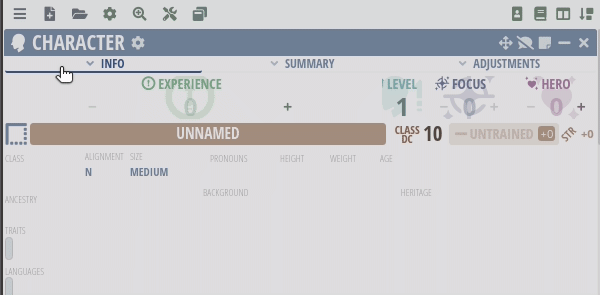
Merlin's traditional biography casts him as a cambion, a being born of a mortal woman, sired by an incubus. That makes him tiefling. Merlin matures to an ascendant sagehood and engineers the birth of Arthur through magic and intrigue. Some king of scholar character.
Ancestry
Merlin is Human. Which gives him 8 hp, medium size, 25 feet land speed, 2 free ability boosts, Common + 1 + your Intelligence modifier additional languages.
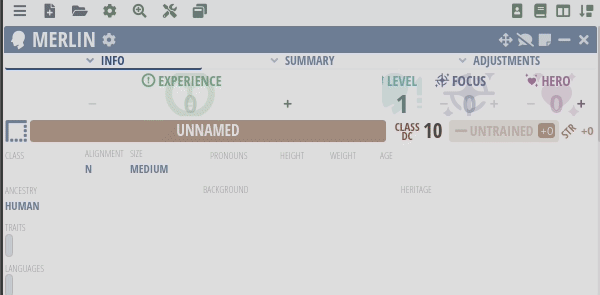
His Human Heritage will be Tiefling Versatile Heritage. Which gives him low-light vision. And ability to choose tiefling ancestry feats.
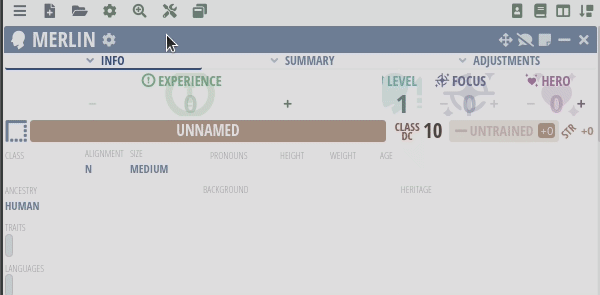
For his ancestry feat we'll choose Devil's Advocate.
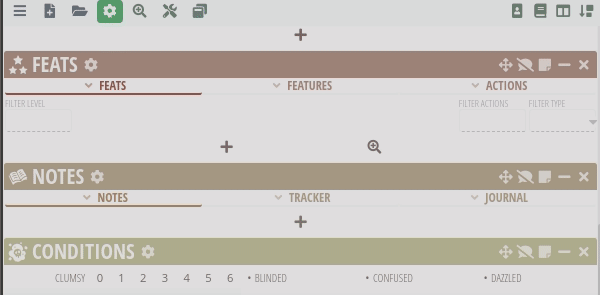
Class
We established that Merlin is Wizard. Often called enchanter.
Wizard's Key Ability: INTELLIGENCE. And wizard gets 6 plus your Constitution modifier hit points per level.
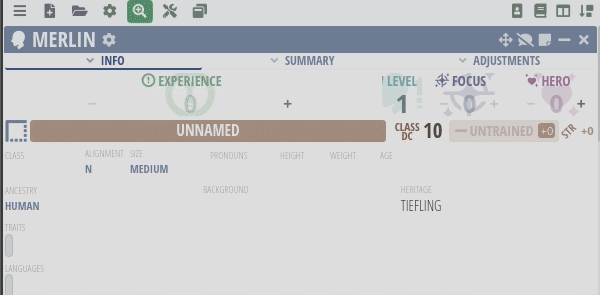
Wizard gets two subclass options. Arcane School would be Enchantment (since he's called enchanter). His Arcane Thesis would be Metamagical Experimentation.
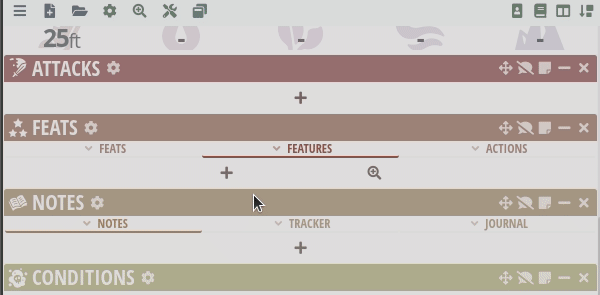
Background
Merlin's background would be Scholar. Which gives Int or Wis and free ability boost. Trained proficiency in Arcana, Nature, Occultism, or Religion skill, and the Academia Lore skill. And Assurance skill feat.
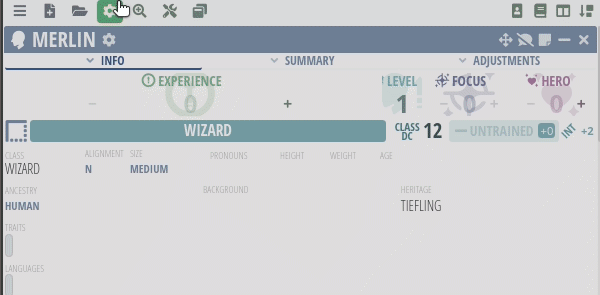
Abilities
4 free abilities:
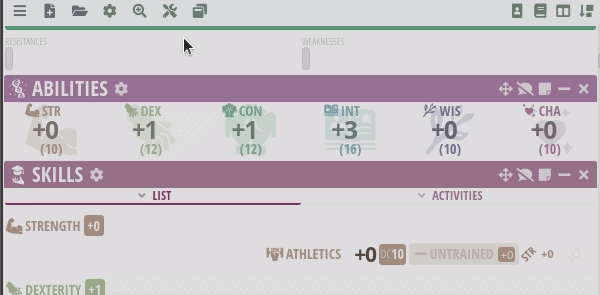
Wizard's class features are:
- ancestry and background: already done
- initial proficiencies: trained in
- Perception
- Fortitude
- Reflex
- Expert in Will
- Arcana (already trained from background, so changed to Occultism)
- number of additional skills equal to 2 plus your Intelligence modifier (which is 2+4)
- club, crossbow, dagger, heavy crossbow, and staff
- unarmed attacks
- unarmored defense
- arcane spell attacks and arcane spell DCs
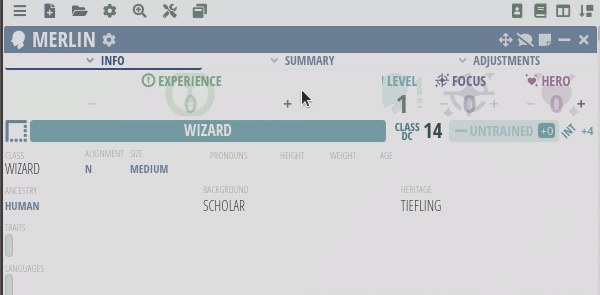
- arcane spellcasting: giving 5 cantrips slots and 2 1st level spells per day. And spellbook with 10 cantrips and 5 1st-level spells. We will use Sample Spellbook.
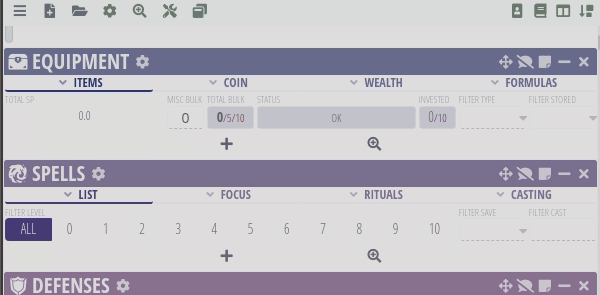
- arcane school gives us +1 enchantment spell (charm) to the book and charming words focus spell.
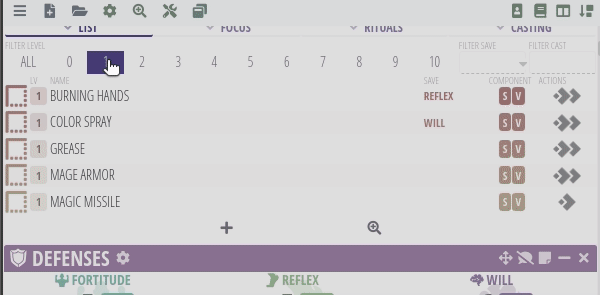
- arcane bond class feature
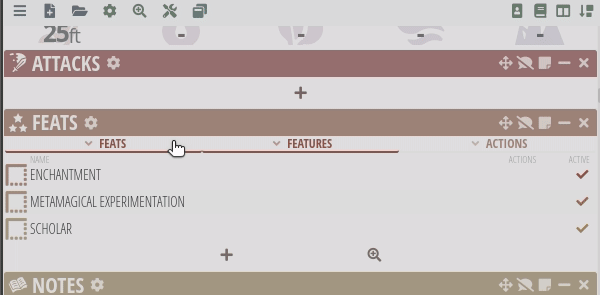
- arcane thesis: METAMAGICAL EXPERIMENTATION gives us metamagic feat. We'll choose Reach Spell.
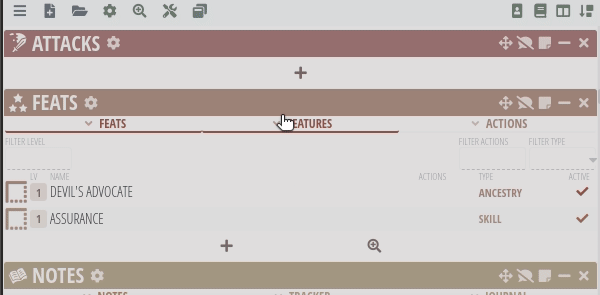
Equipment
Wizard Kit comes with staff, adventurer's pack, material component pouch, writing set and optional crossbow with 20 bolts. We'll take all of it which lefts us with 8 gp 8 sp.
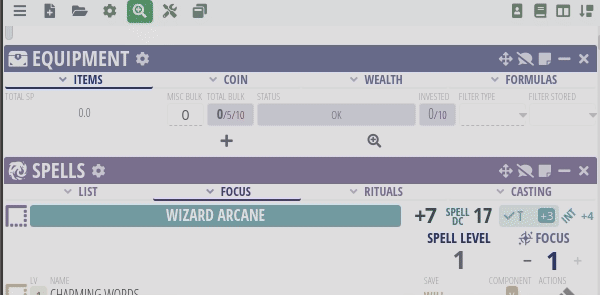
The rest
All bonuses are automatically calculated. But Merlin doesn't have any attacks displayed. We'll add staff and crossbow that are already bought:
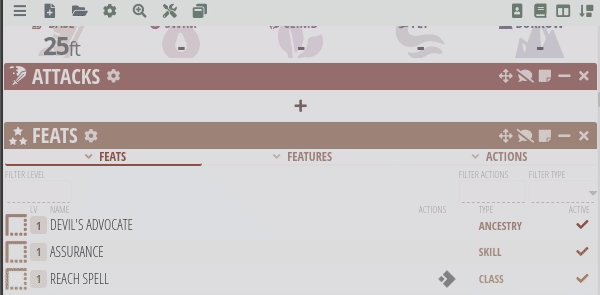
Extra Step. Character setup
I'm using Expanded Rules in this setting. So some options should be enabled in character.pf2.tools when character created:
Proficiency without Level: use no level in bonuses.
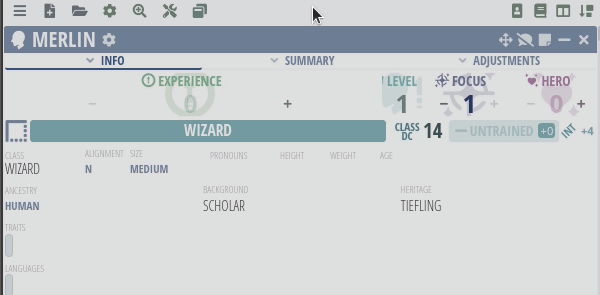
Automatic Bonus Progression: create in CHARACTER \ ADJUSTMENTS "
AUTOMATIC BONUS PROGRESSION" and paste thereATTACK +0 ITEM SKILLNAME +0 ITEM DAMAGEDICE +0 ITEM AC +0 ITEM PERCEPTION +0 ITEM SAVES +0 ITEM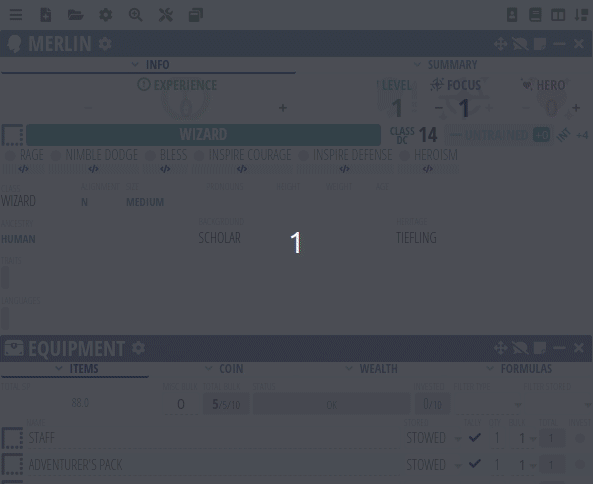
Public access: send link to your GM. Merlin's sheet
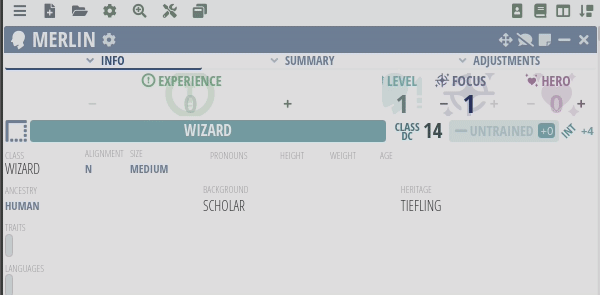
Finished character
Finised Merlin's sheet.
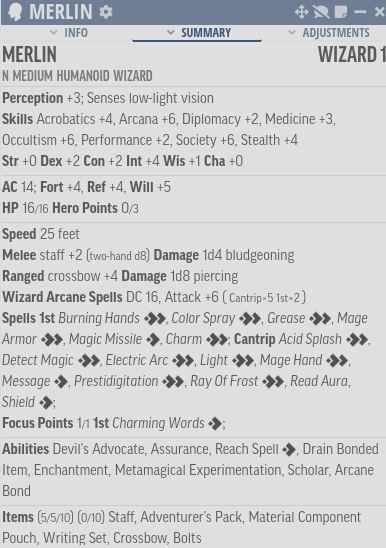
- *[class features]: Abilities that you gain from you class. Can be found in table on class page.
- *[skill feat]: At 2nd level and every 2 levels thereafter, most classes gain a skill feat, though rogues gain them earlier and more often. Your character must be trained in the corresponding skill to take a skill feat.
- *[general feat]: Most classes grant a general feat at 3rd level and every 4 levels thereafter. At each of these levels, you can select any general feat (including skill feats) as long as your character qualifies for it.
- *[ability boosts]: Boost for your ability score. An ability boost normally increases an ability score’s value by 2. However, if the ability score to which you’re applying an ability boost is already 18 or higher, its value increases by only 1. At 1st level, a character can never have any ability score that’s higher than 18.
- *[ability flaws]: Ability flaws are not nearly as common in Pathfinder as ability boosts. If your character has an ability flaw—likely from their ancestry—you decrease that ability score by 2.
- *[GM]: Gamemaster (DM or dungeon masters). Person who runs a game, describes the events taking place and decides on the outcomes of players' decisions.
- *[Versatile Heritage]: Some individuals are born under far stranger circumstances, such as a monstrous, undead, or extraplanar parent, a powerful curse, or an incursion of extraplanar energies. As these circumstances aren't unique to a single ancestry, these heritages—called versatile heritages—are likewise shared by many ancestries.
- *[Key Ability Score]: This is the ability score that a member of your class cares about the most. Many of your most useful and powerful abilities are tied to this ability in some way.
